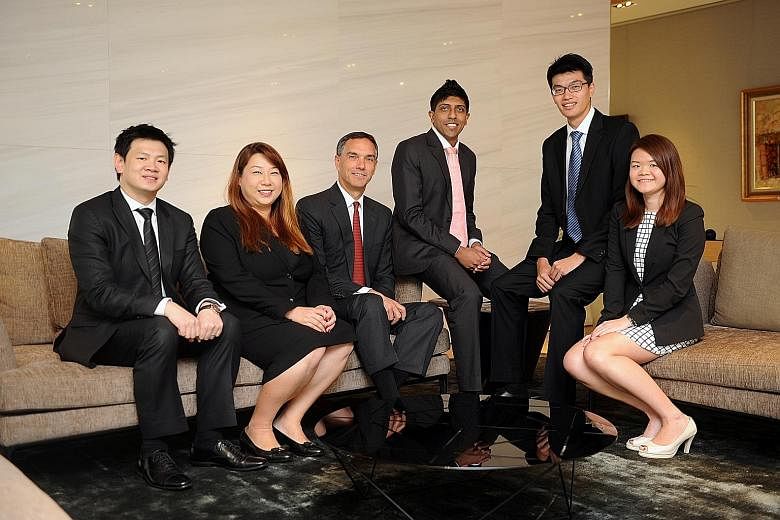The next person to run Citi Singapore could very well be a Singaporean, says the man who holds the job today.
Mr Michael Zink, Citi's country officer here, and head of Asean, told The Straits Times in an exclusive interview last week that he already sees potential leaders in the Singapore talent pool.
"We have an Indian running India, a Korean running Korea, an Indonesian running Indonesia... There's no reason why a Singaporean couldn't run Singapore," he said.
Citi already has several Singaporeans holding senior positions here and abroad.
These include Citibank Singapore chief executive officer Han Kwee Juan, Citi Private Bank global market manager for Asean Jessica Poh and Citi Commercial Bank Vietnam head Raymond Lim.
However, Mr Zink noted, leading Citi here will be no mean feat. Not only is it the biggest employer in Singapore's financial service sector with about 10,000 staff, but its operations are also much more complex than in most other markets.
"When you look at the skill sets, this is not your average country. It's got the consumer banking subsidiary, regional markets hub, private bank, operations and technology centre and the innovation labs in Changi Business Park, a data centre - this is a global operation. This is one of our global hubs."
When a Singaporean does land the top job here, it will be the culmination of a decades-long talent-development process focusing on training citizens to take on leadership positions.
In the 1970s, as the bank was expanding into every corner of the globe, it realised that it had to train local staff in each market or its existing talent pool would be overstretched.
That was when it rolled out its Management Associate programme in all its markets, including Singapore.
Even today, the programme is a "very central pillar to the way we run the place", said Mr Zink.
In Singapore, about 20 fresh graduates - out of the 200 or so that are hired each year - are selected to join the MA programme annually.
"These are people in whom we see something extra - a certain ambition, a certain EQ. Something that says we can accelerate their development. If we invest a little extra in them, they'll grow faster. So you have a core cadre of managers coming through."
In 2004, things went into high gear for Citi Singapore. That was the year that Singapore and the United States signed a free trade agreement, which lifted several restrictions for American banks in the consumer banking space here.
The following year, Citi created its local subsidiary, Citibank Singapore, so that it could go big into local consumer banking. This move made developing local talent all the more important, Mr Zink said.
"It was all built around talent. We had to ramp up from 4,000 people to the 10,000 over the decade, as we built the consumer business from scratch, and then we brought more people into Changi Business Park, where we have our technology people and data centre. You can't import all those guys."
To fuel the rapid growth of its consumer banking business, Citi introduced the Lead programme in Singapore in 2009.
The programme selects around 200 middle managers each year "who are on the brink of managing something big" and helps prepare them for the next level of their careers, Mr Zink said.
This was followed by the launch of the elite Inspire programme in 2012, which selects about 20 high performers a year to be groomed for the very top jobs within Citi.
Citi Singapore's talent-development programmes have been so successful that the bank is informally known in the industry as the "University of Banking"; so many of its high performers have been poached or moved on to leadership positions at other banks.
Notable "graduates" include DBS Group chief executive Piyush Gupta; DBS' consumer banking and wealth management head Tan Su Shan; and United Overseas Bank's managing director of cards and payments Jacquelyn Tan.
But even though local talent development is a core tenet of the business, Mr Zink noted it is unrealistic for the bank here to have a leadership bench completely made up of Singapore residents.
"We're a global institution so we need global talent. It is... a strategic imperative that our leadership team reflects the employee base we're trying to lead and the customer base we're trying to serve. Our consumer bank would be predominantly, overwhelmingly Singaporean, but our institutional bank would not be," he said.
"This is the nature of Singapore's success as a financial centre. A lot of multinationals have headquarters and treasury centres here, and an increasingly big asset-management industry is here. Those companies are global clients. So it would be unusual for the institutional banking staff to be all Singaporeans because our clients are not. And your leadership has to reflect your employee base."
This is already reflected in Citi's staffing and leadership appointments today.
Almost 80 per cent of staff employed by Citi Singapore are Singapore citizens or permanent residents, with close to 60 per cent being citizens.
Over 70 per cent of senior positions, defined as senior vice-presidents and above, are filled by citizens and PRs. Among these, close to 40 per cent are citizens.
Much has been said in recent years about the importance of having Singaporeans in leadership positions in the corporate world.
Mr Zink noted that this is a tough challenge for the organisations that have to commit the time and energy required to train local talent, and for the Singaporeans who want to climb the ladder all the way to the top.
"If you really want my job, it's a steep curve and you have to be willing to take some bruises. And it's not just this place, it's every industry. You have to have the courage to stumble along the way."


